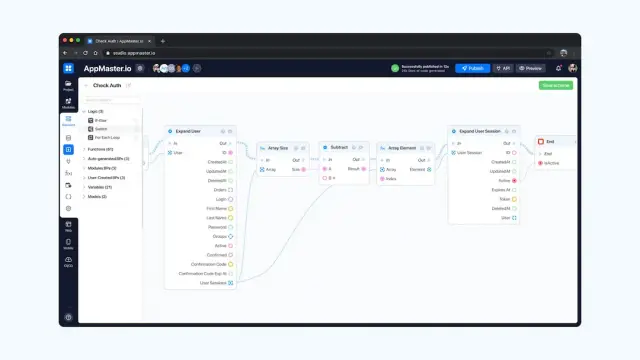Choosing the Right Web App Builder for Your Project
Explore effective ways to evaluate web app builders and discover their pros and cons to make an informed decision for your project needs.

The Importance of Choosing the Right Web App Builder
Developing a successful web app requires a solid foundation, and choosing the right web app builder is critical. The platform you select will determine how efficiently your app will be built, how easy it will be to maintain and scale, and its performance and user experience. Making the right choice is essential for several reasons:
- Time and Cost Efficiency: A suitable web app builder can significantly reduce development time and cost by providing tools, templates, and resources that simplify the process and minimize coding efforts.
- Scalability: As your web app grows in terms of user base and functionality, it's crucial to have a builder that supports scalability without compromising performance or incurring technical debt.
- Customization and Flexibility: Every web app is unique, and the chosen builder must offer customization options and flexibility to create a tailored user experience aligned with your project's needs.
- Integration: Modern web apps often need to interact with third-party services, tools, and data sources. A compatible builder should facilitate these integrations seamlessly to enhance your app's capabilities.
- Potential for Future Growth: Your chosen web app builder should be able to accommodate the evolving needs of your app as it grows, enabling smooth updates and feature additions to extend its lifespan.
- Proper Support and Documentation: Comprehensive documentation, customer support, and community resources will make the development process smoother and help resolve issues more efficiently.
The choice of a web app builder determines the quality of your application and the efficiency of your development process. Making the wrong choice can lead to a subpar product that fails to meet your users' needs, additional costs, technical debt, and wasted time and resources.
Analyzing Your Project Requirements
Before diving into the selection of a web app builder, it's essential to analyze your project's requirements and consider the following aspects:
- Project Scope: Determine the scope of your web app, including the size and complexity of your project, target audience, and primary use cases. This will help you define the level of customization, integrations, and other features needed in your builder.
- Technical Expertise: Evaluate the technical expertise of your team, as this will influence the ease of use and learning curve required for your chosen web app builder. For example, a code-heavy platform might not be ideal for a team with limited coding experience.
- Development Timeline: Estimate the time you have for development and the launch date, as this will impact your choice. Faster-to-implement platforms will suit projects with tight timelines or rapidly changing requirements.
- Budget: Determine your available budget and allocate it wisely across the different expenses, such as platform fees, hosting costs, and additional resources needed for successful web app development.
- Data and Security: Analyze your data storage, processing, and security requirements, as they will influence the security, privacy, and compliance features needed in your web app builder. Different platforms cater to different data needs and maintain varying compliance levels, so choose accordingly.
- Future Growth: Consider the potential for future growth and expansion of your web app. Ensure the platform you choose can accommodate possible increases in user base, functionality, and scalability without any significant issues or technical debt.
An in-depth assessment of your project requirements will provide a solid foundation for choosing the most suitable web app builder and ensure a fulfilling user experience, efficient development, and future-proof results.

Types of Web App Builders
Web app builders differ in their approach, target audience, and functionalities. Generally, they can be categorized into three main types:
- No-code platforms: These platforms are designed for users with little or no technical expertise. They enable app development using drag-and-drop interfaces, visual builders, and pre-built templates that remove the need for hand-coding. No-code platforms are ideal for creating simple web apps quickly and cost-effectively. Examples include Wix, AppMaster, and Bubble.
- Low-code platforms: Low-code platforms balance no-code simplicity and code-based customization. They target users with some technical skills, providing more extensive customization options and greater control over app functionality. These platforms suit a wide range of projects and expertise levels. Examples include OutSystems and Mendix.
- Traditional development environments: These are code-based platforms that cater to experienced developers and more complex projects. They offer the highest level of control, customization, and performance at the cost of longer development times and steeper learning curves. Examples include the Angular framework and React.
Choosing the right type of web app builder depends on your project's needs, the technical expertise of your team, and your desired level of control and customization. Each platform type has advantages and limitations, so evaluate your requirements carefully and select the one that best aligns with your goals.
Factors to Consider When Evaluating Web App Builders
Selecting the most suitable web app builder for your project is essential. But with so many options on the market, how do you decide which one is the perfect fit? Let's dive into some critical factors you need to consider when evaluating different web app builders.
Ease of Use
One of the main reasons for choosing a web app builder is to simplify the development process. A user-friendly interface and intuitive workflow are essential for maintaining productivity and efficiency. Evaluate the learning curve of the platform, availability of tutorials and documentation, and see whether you can easily navigate the builder and create an application without a steep learning curve.
Scalability
Your web app might start small but needs the potential to grow as your business does. Check if the web app builder allows for easy scaling, handling an increasing number of users, or expanding functionalities with your business's growth. Evaluate the platform's ability to handle high-traffic loads, response times, and other performance metrics. Choosing a builder that helps your application evolve while maintaining optimal performance is essential.
Pricing
Cost-effectiveness is an essential aspect when choosing a web app builder. Compare different builders' pricing and subscription plans and see which offers the best value for your budget. Keep an eye on hidden costs, such as payments for additional features, bandwidth, or storage. Also, assess if the platform provides special offers for startups, non-profit organizations, or open-source projects.
Platform Support and Integration
It's crucial to ensure the web app builder supports your desired target platforms (web, iOS, Android, etc.) and integrates smoothly with third-party tools and services you already use or plan to use. Evaluate the available in-built components, pre-built templates, and APIs the platform provides to facilitate seamless integration with other systems. This enables you to connect your application to external services, automate processes, and access additional functionalities without the hassle of manual, custom integrations.
Customization and Flexibility
A tailored user experience is essential for any application to succeed in a competitive market. Ensure the web app builder offers the flexibility and customization options to create a unique and engaging application. Look for a platform that lets you design your app's user interface, choose color schemes, adjust layouts, and, if necessary, add custom code when needed to achieve the functionality or appearance you desire.
Customer Support
A strong customer support system can make a difference when you need assistance during development. Evaluate the platform's available support channels (knowledge base, forum, chat, email, phone), responsiveness, and the quality of assistance. A helpful, reliable support team can ease any roadblocks you face during the development process.
Pros and Cons of Popular Web App Builders
Let's take a look at some popular web app builders' strengths and weaknesses, helping you decide which option might be the best fit for your project:
AppMaster
Pros:
- Powerful no-code platform with advanced features
- Visually create database schema, business logic, and API endpoints
- Fully-scalable applications
- Speedy development and cost-effective solutions
- Flexible plans with access to source code on higher tiers
- Transparent pricing, with special offers for specific sectors
Cons:
- Higher learning curve than simpler web app builders
- May be overwhelming for small projects that don't need all the features
Wix
Pros:
- Intuitive drag-and-drop interface for non-technical users
- Wide range of templates for various industries
- Decent selection of plugins and integrations
- Cost-effective and affordable pricing
Cons:
- Limited customization and capabilities to build advanced web apps
- Less suitable for creating complex applications and managing large volumes of data
WordPress
Pros:
- A wide variety of themes and plugins available
- Large, supportive community
- Supports custom development with PHP
- Free, open-source platform, but may require additional costs for plugins and hosting
Cons:
- Can become slow with too many plugins and complex customization
- Requires knowledge of PHP for advanced customization
- Can be challenging to scale
Bubble
Pros:
- No-code platform with visual app builder
- Flexibility to build various types of web applications
- Responsive design for different devices
- Can integrate with external services via APIs
Cons:
- Higher learning curve
- Performance can be an issue for complex applications
- More expensive than some competitors
Webflow
Pros:
- User-friendly visual web design tool
- Precise control over design and layout
- Generates clean, semantic HTML, CSS, and JavaScript code
- Good performance and fast loading times
Cons:
- Steep learning curve
- May require some knowledge of CSS for customizations
- Limited capabilities compared to advanced web app builders
Why AppMaster Stands Out as a Web App Builder
While each web app builder has its unique pros and cons, one platform stands out for its versatile capabilities, cost-effectiveness, and scalability without sacrificing ease of use: AppMaster.
The AppMasterno-code platform enables users to create backend, web, and mobile applications with a visual interface. It comes with advanced features, such as designing database schema, web UI with drag & drop, creating business logic through visual BP designer, and generating source code for the applications. With these capabilities, AppMaster makes application development 10x faster and 3x more cost-effective than traditional methods.

One of the key advantages of AppMaster is its commitment to scalability. AppMaster applications can adapt easily to growing user bases and be easily modified to accommodate new functionalities. You can rest assured that your app will be fast, responsive, and accessible even as your business expands.
Moreover, AppMaster offers flexible pricing plans that cater to different budgets and project needs. With plans like the free Learn & Explore subscription, you can test the platform's capabilities before committing to a paid plan. Higher-tier plans even offer the ability to export binary files and source code for applications, ensuring maximum control over your project.
While there may be a slightly higher learning curve, AppMaster provides a comprehensive development environment that caters to the needs of both small businesses and enterprises. As a result, the platform is an ideal choice for businesses looking to build web applications with powerful functionality, customization, and scalability.
Final Thoughts
Choosing the right web app builder for your project can be the key to its success, leading to streamlined processes, reduced development time, lower costs, and superior quality. By deeply understanding your project requirements and thoroughly evaluating each platform's capabilities, you can make a more informed decision on which web app builder is best suited to your needs.
Remember that no single platform will be a perfect fit for every project — weighing the pros and cons based on your specific requirements and priorities is essential. For a powerful no-code solution that caters to both new and experienced developers, consider the AppMaster platform. With its advanced features, state-of-the-art technology, and proven scalability, AppMaster is well-positioned to take your web app project from concept to reality more efficiently and cost-effectively.
Regardless of which web app builder you choose, thinking long-term and planning for future expansion and scalability is crucial. Taking the time to make the right decision now will save you countless hours, dollars, and headaches down the road.
FAQ
Choosing the right web app builder ensures a smooth and efficient development process, improves the performance, scalability, and security of your app while reducing development time, saving costs, and meeting project requirements.
Important factors to consider include ease of use, scalability, pricing, platform support, customization, integration capabilities, and customer support.
There are three main types: No-code platforms, low-code platforms, and traditional development environments. Each type caters to different project requirements and levels of technical expertise.
Popular web app builders include AppMaster, Wix, WordPress, Bubble, and Webflow. Each platform has its own benefits and limitations, making them suitable for different user needs and project scopes .
AppMaster is a powerful no-code platform that offers advanced features like database schema creation, business process design, and source code generation. It makes app development 10x faster and more cost-effective, with no technical debt.
Most web app builders offer a free trial or a limited free tier to explore their features and get a feel for the platform. AppMaster.io, for example, has a free Learn & Explore plan for testing its capabilities.
Although possible, switching web app builders can be challenging. When selecting a platform, think ahead in terms of long-term project needs, future growth, and scalability to avoid making a switch later.
Yes, several web app builders, including AppMaster, offer discounted pricing or special programs for startups, educational institutions, non-profit organizations, and open-source projects.





